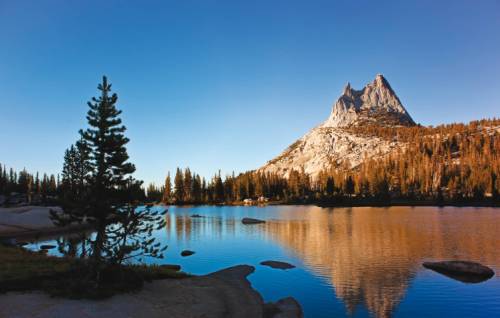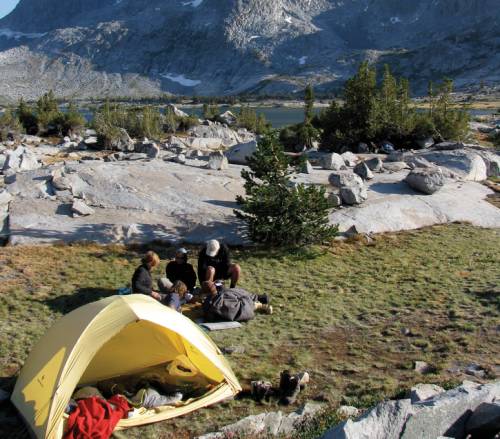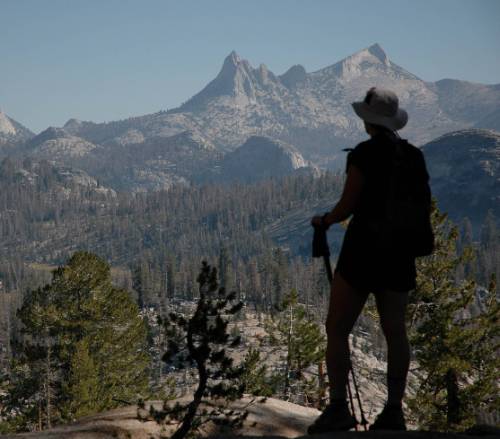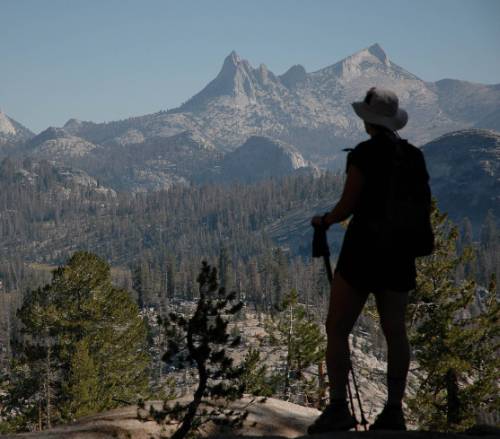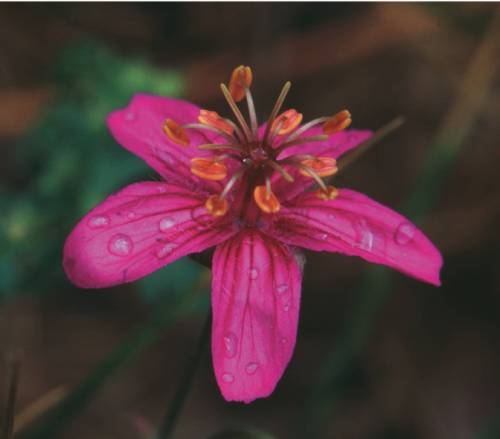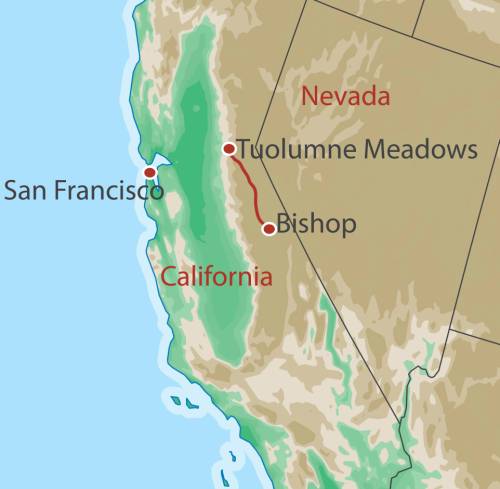John Muir Trail
John Muir Trail
$6790
John Muir Trail
26 Days Starting in Bishop and ending in Yosemite Valley, USA
Visiting: Bishop, John Muir Trail, Mount Whitney, Sequoia and Kings Canyon National Parks, Kings Canyon National Park, Big Pete Meadow, Muir Trail Ranch, Mammoth Mountain, Thousand Island Lake, Yosemite National Park, Yosemite Valley
Tour operator:
Tour code:
JMT
Guide Type:
Fully Guided
Group size:
6 - 10
Trip Styles:
Active, Adventure Tours, Camping, Walking Hiking and Trekking
Activities:
Tour Overview
Embark on an unforgettable adventure along the iconic John Muir Trail, traversing the breathtaking Sierra Mountain Range and culminating in the majestic Yosemite Valley. This challenging trek invites seasoned adventurers to summit Mount Whitney, the highest peak in the contiguous United States, and cross numerous high mountain passes over 3000 meters. Experience the awe of walking among alpine peaks, glacier-carved canyons, and pristine lakes, while immersing yourself in lush meadows and pine forests. With 25 nights of camping, you'll carry your own gear and enjoy the support of professional certified mountain guides. Resupply drops and emergency support ensure a safe journey, while shared tents and group equipment lighten your load. This is a once-in-a-lifetime opportunity to challenge yourself on a classic long-distance trail, creating memories that will last forever.
Highlights
Itinerary
Day 1 : Join Bishop
Location: Bishop
Accommodation Name: Cottonwood Campground
Today is a day to go over our gear and prepare for the adventure ahead. We meet at our headquarters in Bishop (approx. 11:00am), do a gear check, collect resupply bags, and pick up last minute items before heading south to Horseshoe Meadows. It will be a busy morning, clarifying resupply needs, finalising personal gear, and distributing group gear. You will have 7 days of personal snacks and powdered drinks in your pack when we meet, which you provide. You will purchase your own lunch in Bishop and after lunch we will drive approx. 2 hours to the Cottonwood Campground. We'll camp at the Cottonwood Campground which is already at approximately 3000m (10,000 feet) in elevation - Giving us a chance to further acclimate before beginning our adventure. *Complimentary transfer from hotels in Mammoth and Bishop, upon request.
Day 2 - 4 : Commence John Muir Trail at Cottonwood; hike to Crabtree Meadow.
Location: John Muir Trail
Accommodation Name: Camp at Chicken Springs Lake
To further assist in acclimation, we start off slowly and ease into the hiking with a short first day of about 8km and 400m altitude gain taking us to camp at Chicken Springs Lake. From there, we lose some elevation, spending the next 2 nights between 2900m-3200m as we approach Mt. Whitney. Daily distances are approx: 8, 16, and 13 km
Day 5 : Summit Mount Whitney
Location: Mount Whitney
Accommodation Name: Crabtree Meadows or Guitar Lake
We plan to make our base at Crabtree Meadows or Guitar Lake for 2 nights in order to reduce pack weight and focus on the big day ahead - The summit of the highest point of our journey, the stunning Mount Whitney (4418m). The hike is approximately 23km, round trip, with an elevation gain of approximately 1200m. We will be happy we only have to carry enough items for the day - And for the final summit push, we can even leave these at Trailcrest to be picked up on our way back down. Those who are not feeling up to the big day can easily stay in camp, soak up the scenery and relax.
Day 6 - 8 : Hike to Rae Lakes via Forester Pass and Glen Pass
Location: Sequoia and Kings Canyon National Parks
Accommodation Name: Camp at Rae Lakes
This is a spectacular segment as it traverses high glacial bowls far above the main river drainage system and includes two of the highest passes on the trail - Forester Pass at 4025m and Glen Pass at 3650m, before descending to beautiful Rae Lakes where we pick up our food re-supply.Daily distances of approx. 12 - 21km
Day 9 - 13 : Rae Lakes to Big Pete Meadow
Location: Kings Canyon National Park
Accommodation Name: Camp at Big Pete Meadow
From Rae, we head down to Woods Creek and climb up over Pinchot Pass (3690m) before dropping into the expanse of Upper Basin at the head of the South Fork of the Kings River. The crossing of Mather Pass (3670m) gives us a view of our route to the north before we descend the 'Golden Staircase' that takes us far down into Palisade Creek and the deeply incised Le Conte Canyon. Our next resupply comes in via mule and we pick that up at Big Pete Meadow.Daily distances of approx. 13-19km
Day 14 : Rest Day in Big Pete Meadow
Location: Big Pete Meadow
Accommodation Name: Camp at Big Pete Meadow
After 13 days of hiking we will enjoy a rest day at Big Pete Meadow. This is the perfect location to kick up your feet and enjoy the views. You can choose to spend the day relaxing in the sun, taking a day hike or swimming in the river. We also schedule a resupply via mules on the rest day so that we can enjoy delicious, fresh food while we relax and recover.
Day 15 - 17 : Hike to Marie Lake for resupply
Location: Muir Trail Ranch
Accommodation Name: Camp at Muir Trail Ranch
For many people, this is the most beautiful section of the JMT. We stay high through the Evolution Valley, pass by the stone shelter at Muir Pass (3645m), commence a large swing out to the western Sierra, and gradually lose elevation until we reach our lowest point of about 2390 meters at Muir Trail Ranch. Our resupply has been sent by post and awaits our arrival. Daily distances of approx. 13, 24, and 24km.
Day 18 - 21 : Hike to Johnson Meadow for resupply
Location: Mammoth Mountain
Accommodation Name: Camp at Johnson Meadow
Here, we cross the Silver Divide with its small lakes and jagged peaks. Lots of smaller ups and downs characterize this section and the really big passes are now behind us. The terrain and vegetation changes as we near Mammoth Mountain and we hit our first 'civilization' and road at Red's Meadow. We pick up our resupply here.Daily distances of approx. 14-23km
Day 22 - 24 : Hike to Cathedral Lakes
Location: Thousand Island Lake
Accommodation Name: Camp at Cathedral Lakes
The days are now a lot easier with less elevation change and the miles will pass by easily. We traverse the Thousand Island Lake area that is well known for its serenity and wonderful rock colours. We camp at lovely Catheral Lakes on day 24 where our last resupply awaits us.Daily distances of approx. 18km - 19km.
Day 25 : Hike to Sunrise Creek
Location: Yosemite National Park
Accommodation Name: Camp at Sunrise Creek
The next day, we head out along the Sunrise High Sierra Camp and down to our last campsite in the trees of Sunrise Creek. There are no passes during the final days, only gorgeous canyons, alpine lakes, and world class waterfalls.Daily distance of approx. 16km.
Day 26 : Hike to Yosemite Valley and transfer to Bishop or Mammoth Lakes
Location: Yosemite Valley
On the final day, we get up early to beat the heat and start the long descent into Yosemite Valley. We take the mist trail down past the Emerald Pool, Vernal Falls, Nevada Falls and finally to the bustle of Curry Village where our shuttle is waiting for us. We expect to arrive at Yosemite Valley around midday. It is a long shuttle back to Bishop or Mammoth Lakes, approx 2-3 hours, where our great adventure comes to an end but a lifetime of stories lies ahead.If you are flying out of Reno, Nevada, it is a four hour bus ride to the airport. We strongly recommend staying at a hotel in Bishop or Mammoth on this final evening, so that we do not need to rush our final day. Daily distance of approx. 10km.
What's Included
-
Accommodation
25 nights camping -
Professional certified mountain guide(s)
The tour includes professional certified mountain guide(s) with wilderness first aid certification, maintaining a maximum ratio of 5 hikers to 1 guide.
-
Transfers
Transfer from Mammoth Lakes to Bishop on day 1 of the trip and transfer back to Bishop or Mammoth Lakes on the last day of the trek is included upon request.
-
Group equipment
Group equipment such as tents, food canisters, and water purification are provided.
-
Porter or mule supported supply drops
Porter or mule supported supply drops are included during the trip.
-
Contingency and emergency support
Contingency and emergency support, including phone and radio, is provided.
-
First aid kit
A first aid kit is included in the tour.
-
All necessary permits
All necessary permits for the trek are included.
What's Not Included
-
Flights and Airport taxes
Flights and airport taxes are not included in the tour.
-
Personal gear
Sleeping bag, sleeping mat, and backpack are not included and must be provided by the participant.
-
Meals not indicated in the itinerary
Meals not indicated in the itinerary, snacks during the trek, and hot beverages are not included.
-
Items of a personal nature
Items of a personal nature such as laundry, phone calls, postage, soft drinks, and alcoholic beverages are not included.
-
Pre or post trip accommodation
Pre or post trip accommodation, or additional accommodation due to weather delays, is not included.
-
Travel Insurance
Travel insurance is compulsory but not included in the tour.
-
Visas
Visas are not included and must be arranged by the participant.
-
Guide gratuities
Guide gratuities are not included in the tour.
-
Medical treatment and evacuation charges
Medical treatment and evacuation charges are not included.
Accommodation
25 nights camping. Please note that travellers will need to share tents, due to weight and camping locations.
What You Carry
Participants are expected to carry their own personal belongings including sleeping bag, sleeping mat, fly sheet or tent, food, water, as well as a change of clothes etc. This should total around 15 to 20 kgs and be carried in a backpack of 70 to 75 litres. Resupplies will be picked up every four to six days in order to reduce weight. One of the resupplies needs to be mailed in, and orders for snacks, etc. will need to be made at least one month prior to departure. Additional information will be provided upon booking. We will use a Wag Bag while in the Mt. Whitney Zone, this is on Day 4 & 5 of your trip. You will be expected to carry it out from the Whitney Zone, on Day 5 to the next resupply on Day 8, where the porters will then carry it out and dispose properly. Your guides will also show you how to use it on Day 1 of your trip. This is a requirement by the Park and Forest Service.
Grading
Anyone undertaking a challenging adventure should be aware of the physical and mental demands involved. Our challenging treks are designed for experienced adventurers who are seeking a real challenge. A well above average level of fitness is required as days can involve 10 hours of strenuous exercise in very remote and rugged terrain, and some walks may be exploratory venturing far off the beaten track. Because this is a full pack hike, we recommend that people begin their fitness preparation immediately upon booking. Solid work outs that are aerobic (hill walking, jogging, swimming, biking or gym work) of up to one hour each day is a guide to a routine training program; interspersed with a relatively demanding weekend hike with a backpack that weighs approx 17 kgs or more on some occasions! The best exercise for trekking is bushwalking involving relatively steep ascents and descents; multi day walks are ideal preparation for our challenging adventures. If you can be as fit and prepared as possible, you will enjoy the trip so much more. It is far more preferable to plan towards it being a holiday than a survival experience! This is a trip of a life time and the fitter you are, the better time you will have.
What You Carry
Participants are expected to carry their own personal belongings including sleeping bag, sleeping mat, fly sheet or tent, food, water, as well as a change of clothes etc. This should total around 15 to 20 kgs and be carried in a backpack of 70 to 75 litres. Resupplies will be picked up every four to six days in order to reduce weight. One of the resupplies needs to be mailed in, and orders for snacks, etc. will need to be made at least one month prior to departure. Additional information will be provided upon booking.
We will use a Wag Bag while in the Mt. Whitney Zone, this is on Day 4 & 5 of your trip. You will be expected to carry it out from the Whitney Zone, on Day 5 to the next resupply on Day 8, where the porters will then carry it out and dispose properly. Your guides will also show you how to use it on Day 1 of your trip. This is a requirement by the Park and Forest Service.
Mode of Transport
Transfers from Mammoth Lakes to Bishop on day 1 and back to Bishop or Mammoth Lakes on the last day of the trek are available upon request. Porter or mule supported supply drops are provided during the trip.
Check out our Q&As
-
What kind of physical preparation is recommended for this trek?
A well above average level of fitness is required as days can involve 10 hours of strenuous exercise in very remote and rugged terrain. It is recommended to begin fitness preparation immediately upon booking, with aerobic exercises like hill walking, jogging, swimming, biking, or gym work for up to one hour each day. Weekend hikes with a backpack weighing approximately 17 kgs or more are also suggested. The best exercise for trekking is bushwalking involving relatively steep ascents and descents.
-
What will I need to carry during the trek?
Participants are expected to carry their own personal belongings including a sleeping bag, sleeping mat, fly sheet or tent, food, water, and a change of clothes. This should total around 15 to 20 kgs and be carried in a backpack of 70 to 75 litres. Resupplies will be picked up every four to six days to reduce weight.
-
How are waste management and environmental responsibilities handled during the trek?
While in the Mt. Whitney Zone, participants will use a Wag Bag, which is a requirement by the Park and Forest Service. You will be expected to carry it out from the Whitney Zone on Day 5 to the next resupply on Day 8, where porters will then carry it out and dispose of it properly. Guides will show you how to use it on Day 1 of the trip.
-
What kind of support is provided during the trek?
The trek includes professional certified mountain guides with wilderness first aid certification, with a maximum of 5 hikers to 1 guide. There is also contingency and emergency support, phone and radio, and a first aid kit available. Porter or mule supported supply drops are provided during the trip.
-
What is the accommodation arrangement during the trek?
The accommodation consists of 25 nights of camping. Travellers will need to share tents due to weight and camping locations.
-
Who will be my travelling companions on the tour?
We have offices on three continents which means your travelling companions will be just that – international and wonderfully eclectic. Part of small group travel means that although travellers come from various locations and backgrounds, you will be travelling with like-minded companions who, like you, are keen to share the experience and forge lifelong friendships.
-
What about environmental impact?
We believe that adventure travel revolves around establishing a strong relationship with the people and environments in which we operate. Our responsible travel policies have been carefully developed to ensure that we minimise the impact of our presence and help to protect the regions we visit while contributing positively to the local community.
-
What should I pack?
Your pre-departure documents include a detailed packing list with items that you need to bring. While most of the equipment for daily activities is included in your tour cost, some items like helmets and hiking boots are best brought from home. The pre-departure documents also include information on layering and recommended brands for various items to ensure you are fully prepared for your trip.
-
Do you operate a “single share” option and how does it work?
Yes. World Expeditions does not require single travellers to pay a surcharge for travelling alone on the vast majority of our trips. Our holidays are primarily on a twin share basis, so if you are joining the group as a solo traveller, we will match you with someone of your own gender. The choice is yours however; if you prefer not to share, we do offer single supplements for private occupancy.
-
Are tips included in my trip price?
Tips are not included in the tour cost. Tipping is a personal thing, do not worry about how much, or when, to tip. Tipping guidelines are provided for certain destinations in our pre departure information upon booking, however the best advice will be provided by your tour leader.
-
Am I suited to small-group travel?
We recognise that many of our travellers have not been on a ‘group trip’ before. Yet what our departures provide is both structure and flexibility, allowing you plenty of freedom within the framework of the itinerary. You’ll find that with our maximum group size at 16, you’ll travel in a minimal impact style with a great group of like-minded travellers.
-
Can you advise which vaccinations are recommended?
While our pre-departure kit provides information on vaccinations, we suggest that you consult your doctor, local government inoculation centre or a travel medical specialist in order to get the most current advice regarding vaccination requirements.
Reviews from travellers on this tour
1 Select your preferred date
Sunday - Thursday
Aug 10, 2025 - Sep 04, 2025Sunday - Thursday
Jul 05, 2026 - Jul 30, 2026Sunday - Thursday
Aug 02, 2026 - Aug 27, 2026Sunday - Thursday
Aug 30, 2026 - Sep 24, 2026Book with Confidence
-
Transfer as credit to Future Tours
World Expeditions allows you to transfer existing payments to a future tour to avoid cancellation fees if you can't travel and inform world expeditions, 70 days before departure.
-
Low Deposit
World Expeditions requires a minimum deposit of 400 GBP per person or the full booking value, whichever is less, with the final balance not due until 70 days before departure.
-
Cancellation Policy
We don't charge a cancellation fee, here is a summary of world expeditions charges.
Up to 70 days before tour starts: Forfeit 100% of deposit.
At 69 days before tour starts: Forfeit 50% of booking price.
At 35 days before tour starts: Forfeit 100% of booking price.
